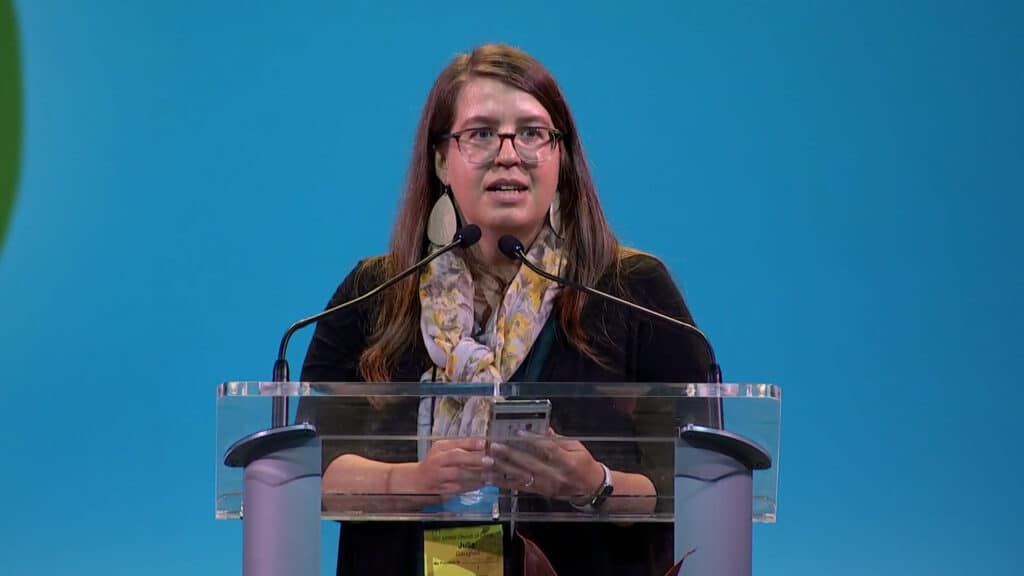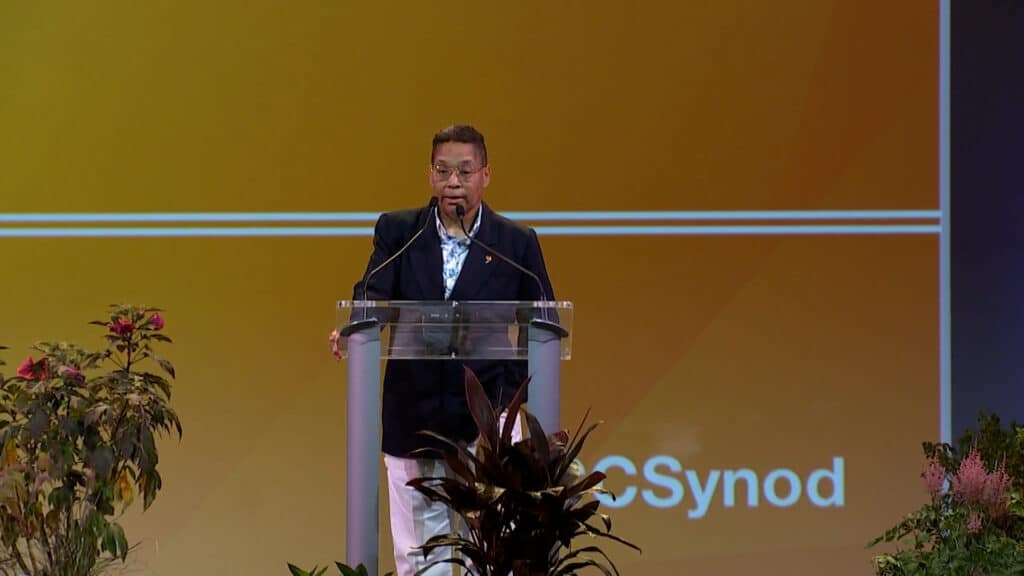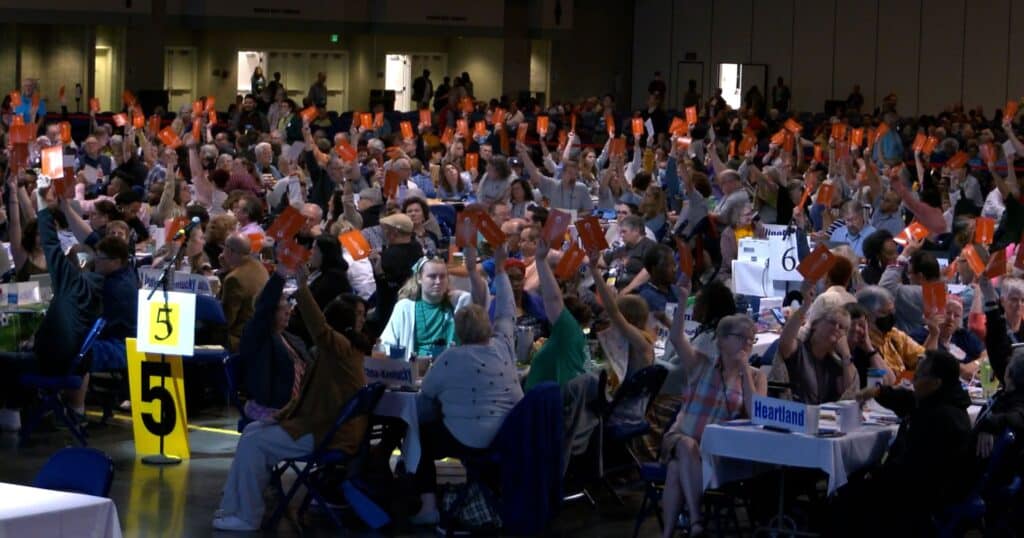General Synod frequency to change to every three years as Bylaw changes pass by a single vote
In discussions that spanned three plenary sessions on Monday, July 3, the United Church of Christ’s General Synod affirmed a series of Bylaw changes that will cause the event to take place every three years, instead of every two.
The official vote, which needed a two-thirds majority vote from Synod delegates, passed by a margin of one, with 454 voting yes and 226 voting no. There were six abstentions.
The results followed extensive debate and a commitment from incoming UCC Board chair Julia Gaughan to bring a new measure before the 2025 General Synod that will address shortening the nine-year length of term for board members that accompanies the changes passed today. Under UCC Bylaws, board members serve over three Synod meetings, which has meant a six-year tenure and now means nine.
Delegates who opposed the Bylaw amendments also proposed and passed a minority resolution, which officially records their position alongside the one that was approved by Synod vote.
The new schedule for Synod frequency takes effect after the 35th General Synod in 2025, so that the 36th Synod will be held in 2028.
Many viewpoints
A number of delegates speaking on the plenary floor expressed concern about the strain that planning Synod places on National Setting staff and the financial challenges that accompany it. Some suggested a less frequent Synod could allow for different kinds of gatherings.
The Rev. John Gage, pastor of Congregational Church of Needham in the Southern New England Conference and a self-described “General Synod superfan,” has attended every gathering since 1999. He said that “the resources that we receive here are only affecting a minute portion of our denomination. By freeing up resources, we can share more widely.”

A variety of concerns about the Bylaw changes were expressed, including how meeting less frequently would create less connection within the denomination and less of an ability to respond to pressing justice issues.
“I am concerned in this particular moment in time about the importance of being able to respond, and the attacks are moving so quickly that three years means there won’t be resolutions that can step up and respond in a timely manner,” said Mimi Goodwin of All Nations Indian UCC in the Minnesota Conference and part of the Council for American Indian Ministries.
Questions about board terms
A concern with how the Bylaw changes will result in nine-year terms for board members was vocalized by several delegates, including Charles Buck, president and CEO of United Church Funds, who said the change impacts their board as well.
Moderator Robert Sandman informed delegates that because the series of proposed Bylaw changes were overlapping and interlocking, it would not be acceptable to bifurcate or change some parts without others.
UCC Board and Synod frequency task force member Hannah Cranbury said that the possibility of changing the board term was discussed at length when preparing the Bylaw changes, and ultimately the decision was made to use a “lighter touch” and leave this part of the Bylaws, which describes a board term as lasting across three Synod gatherings, unchanged.
In response to delegate concerns, Gaughan made the commitment to revisit the length of board terms in the Bylaws at the next General Synod in 2025, which she said would happen before the term changes would have an impact. Through a consensus process of small group discussion and raising cards to demonstrate support, delegates accepted this proposal.
Technical issues
As delegates moved to vote Monday afternoon, technical difficulties with the electronic voting app left some unable to vote, which initially resulted in an invalid count. The process was delayed, and there was some discussion about whether to continue with the agenda due to time constraints.
At one point, Sandman proposed moving forward to hold a vote on the next resolution — one that calls the church to confront white supremacy — while voting app issues were still being addressed because, he said, the resolution was expected to pass by such a large margin. After delegates pressed against this, citing the importance of every person’s voice and vote, Sandman apologized and committed to waiting to vote on the Bylaws changes until every voter could have assurance their vote would be counted.
Ultimately, a decision was made to offer delegates replacement devices or the option to vote by paper ballot. The official final vote reached the exact minimum number it needed to achieve a two-thirds margin and pass.

Minority resolution
At the evening plenary session, some delegates proposed a minority resolution that would formally record the voice of those who opposed the measure.
The text resolves that “the minority of 226 delegates affirms their objection to this amendment to the Bylaws on the basis of, but not limited to, the decrease in in-person fellowship that the Scripture directs (Hebrews 10:24), stewardship, extended leadership terms and their extensions’ impact on leadership opportunities and development in the church, and the ability of delegates to respond to current events.”
It also proposes creating a committee to “support fellowship within and between Conferences and with the National Setting.”
After discussion where only the 226 who voted no to the original measure could participate, the minority resolution passed with the needed simple majority.
Content on ucc.org is copyrighted by the National Setting of the United Church of Christ and may be only shared according to the guidelines outlined here.
Related News
A Prophetic Call for Justice and Peace in Palestine
The executive leaders of the United Church of Christ have issued the following statement...
Read More‘Love is Greater Than Fear’: Regional Youth Events get to the heart of gospel message
United Church of Christ teens attending this summer’s Regional Youth Events (RYE) are...
Read MoreUCC desk calendars available to order now
Prepare for your day, month and year with the United Church of Christ desk calendar —...
Read More


